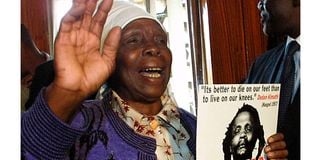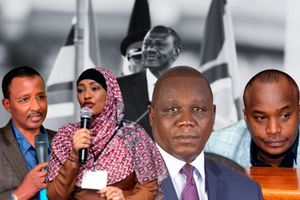How Mukami kept Kimathi name alive over the years

Mukami Kimathi holds the portrait of her husband Dedan Kimathi, a former Mau Mau freedom fighter. Mukami died on May 5, 2023 and will be buried in Njabini, Kinangop, Nyandarua County.
When I was six years old, Mukami Kimathi identified me as the person who would write her story. I would often read out to her, in my halting voice, my father’s newspapers, poring over pictures together, enjoying her company.
We developed a close friendship that transcended years. Mukami and her children were frequent visitors to our home and we to hers. She told us stories. She had been a warrior, she said, who fought for black people, Watu Weusi, whose rights had been trampled and their land taken away by the colonialists.
She always ended her stories with the words Mbaara ndiri mwago (there is no fun in war). Mukami’s life provides us the lens to see the wider picture of women freedom fighters providing an important complement to existing written records on Kenya’s history.
She told us Princess Elizabeth, while in Kenya, had acceded to the throne becoming Queen Elizabeth II in 1952 and Governor Sir Evelyn Baring signed the order to create a state of emergency in the same year.
Colonial forces then launched Operation Jock Scott to get rid of the leadership of the Mau Mau.
Several politicians and their families including, Jomo Kenyatta, Gaakara Wanjaũ, Bildad Kaggia, Fred Kubai, Achieng’ Oneko, Kung’u wa Karumba, Paul Ngei and two women leaders Rebecca Njeeri and Sara Sarai were arrested.
Mukami Kimathi and her husband Dedan Kimathi escaped. Kimathi went into the forest to fight and later lead the Land and Freedom Army (KLFA) known to many as the Mau Mau.
Mukami left her daughter Nyambura and son Waciuri with Kimathi’s mother Nyambura and followed her husband to the forest.
The fighters had ranks and were grouped in platoons. When Mukami was not leading her platoon in war, she was the quartermaster general of the Karia-ini KLFA camp. She supervised the stores and distributed resources such as the food and organised food supply and medical care. Her duties also included camp adjutant, in charge of security and discipline.
The Mau Mau people I interviewed for her book spoke of how well organised she was as a quartermaster and how brave she was in war.
In time, Kimathi, who had taught Mukami to recruit people to Mau Mau by “asking the right questions,” sent her to Nairobi. Her key role was to recruit people to Mau Mau, organise them in community groups introducing those who lived near each other.
She was also tasked with gathering war intelligence for the Mau Mau and organise the distribution of pamphlets Kimathi authored, many of which began with the words “We are fighting for our lands – the Kenya Highlands which were stolen from the Africans by the Crown through the Orders in Council 1915, of the Crown Lands Ordinance which evicted Africans from their lands at present occupied by the settlers or reserved for their future generations while landless Africans are starving of hunger or surviving on the same land as cheap labourers to the settlers who were granted that land by the Crown.”
Mukami also had to ensure the line of communication between the Mau Mau fighters in the forest and leaders in Nairobi was not broken. As quartermaster, a consisted supply, from Mau Mau sympathisers of food, medicine, blankets, uniforms, and other items of clothing was also expected.
In April 1954, she was arrested for not carrying a passbook authorising her to move from one point to the other.
She was taken to Lang’ata Detention Camp and then to Kirigiti detention centre, where she escaped, freeing several prisoners as well. She was arrested again and detained for life at Kamiti Prison, kept under close guard with other Mau Mau leaders’ wives in an enclosure called Kambi ya Fisi, hyena’s camp.
She was tortured and often beaten senseless, and demands made of her to divulge information about Kimathi. She was always so proud that they never succeeded in breaking her. Dedan Kimathi was captured while she was still in Kamitī.
His capture marked the end of the war. On the day before he was hanged, Mukami was taken by the prison authorities to see Kimathi. His last words to her were “keep my name alive. They will kill me but do not let them kill my name Kimathi wa Waciuri.”
For many years, she struggled to keep his name alive. However, it took the intervention of human rights activists Kang’ethe Mungai, Beatrice Kamau, Ramadhan Khamis and Mbugua Muriithi, Dr. Willy Mutunga and Raila Odinga to highlight her neglect by the government.
In 2003, Kenya’s third President Mwai Kibaki lifted the 40-year-old ban on the Mau Mau, and unveiled in 2007, a new statue of Dedan Kimathi and named a University and location after him. Uhuru Kenyatta gave Mukami the highest recognition, the Moran of the Burning Spear, consistent support for school fees and his personal phone number, which she often called.
Mukami’s story allows us an insider’s view of the often-undocumented role of women in war as fighters. She says it was women, often regarded with less suspicion by the colonialists than men who ferried weapons, bullets and information for the Mau Mau. They also farmed and kept the food in designated places for the Mau Mau.
Mukami also gives us a glimpse into the rifts between home guards and Mau Mau. She believed that although the Mau Mau contributed to the defeat of the colonialists and gained independence for Kenya, the colonialists drove an internal and permanent wedge between family and clan members.
She spoke bitterly of the Kimathi family land, where his mother is buried, which was allocated to home guards who occupy it to date.
Mukami told me she wanted her story to be told “so that when I leave this earth, young girls will be inspired to stand up for justice, and for what is right, know that no injustice was too big to be fought and that the Mau Mau did not fight for nothing. She asked me often to remind Kenyans to take care of the country the Mau Mau fought for. She wanted her story to give future generations hope that there are other people who have had worse problems who ended up creating better lives for themselves.”
Mukami loved her children, Waciuri Kimathi, Nyambura Kimathi, Waceke Kimathi, Maina or Wangome Kimathi, Nyakinyua Kimathi, Wangechi Kimathi, Wangui Kimathi, Muthoni Kimathi, Nyawira Kĩmathi and Wanjugu Kĩmathi.
Like many freedom fighters, she said, her children suffered because their parents gave their lives to the country. That is something she lived with, something that gave her grief every day.
Mukami died grateful that her husband Dedan Kĩmathi is now revered and rightfully regarded as the symbol of freedom and Kenyan resistance to British colonial rule.
She was deeply appreciative of human rights activists and academicians such as Ngugi wa Thiongo, Micere Mugo and Maina wa Kinyatti for keeping her husband’s name alive. Mau Mau fought for the first liberation but it was academicians and human rights activists who fought for the second liberation whose fruits we now enjoy in the new Constitution, she often said.
At her book launch, she sent a specific request to Queen Elizabeth II to help her find her husband Dedan Kimathi’s body, stating that it was unacceptable that no-one knew where he had been buried. If Mukami was alive, I have no doubt she would have asked the same of the newly crowned King Charles III.
- Wairimu Nderitu is the author of ‘Mukami Kimathi, Mau Mau Freedom Fighter’




